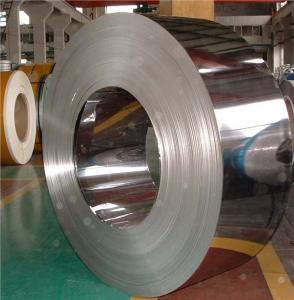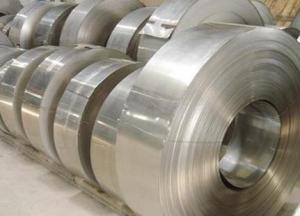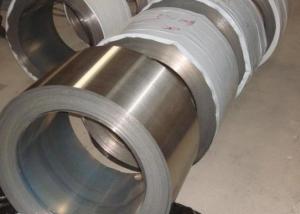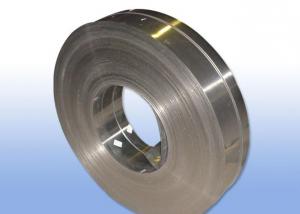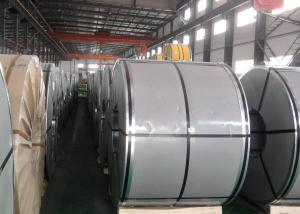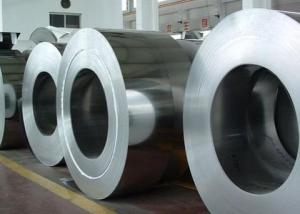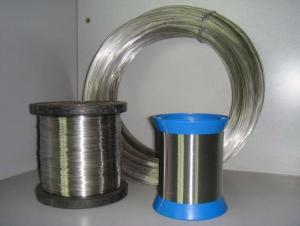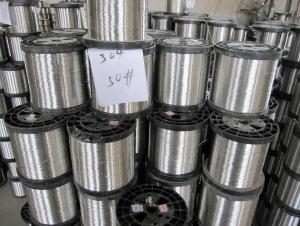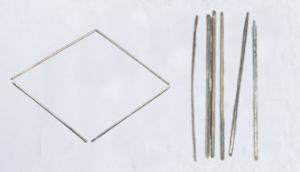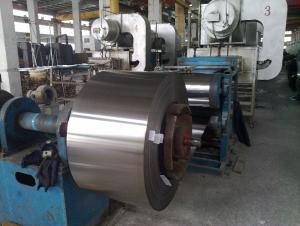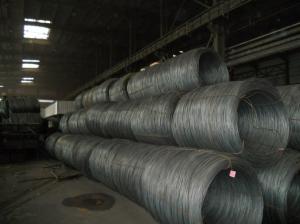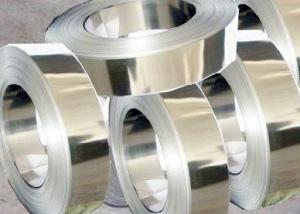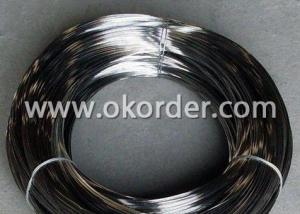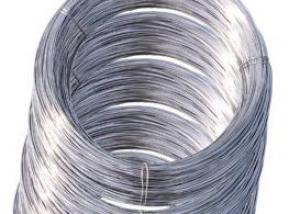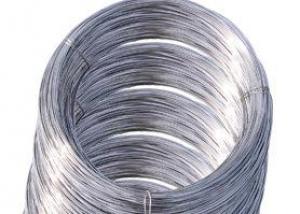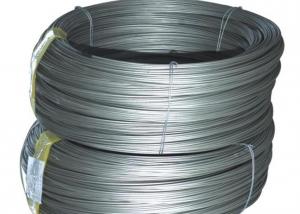AISI 201 Stainless Steel Strips
- Loading Port:
- China Main Port
- Payment Terms:
- TT or LC
- Min Order Qty:
- 1 Ton m.t.
- Supply Capability:
- 2000 Tons Per Month m.t./month
OKorder Service Pledge
OKorder Financial Service
You Might Also Like
AISI 201 Stainless Steel Strips
1. Chemical composition of AISI 201 Stainless Steel Strips
C | Si | Mn | P | S | Ni | Cr |
max0.15 | max1.00 | 5.50-7.50 | max0.06 | max0.03 | max1.00 | 16.00-18.00 |
2. Mechanical properties of AISI 201 Stainless Steel Strips
Yield Strength | Tensile | Elongation | Hardness (HV) | Hardness (HRB) |
245 | 640 | 40 | 253 | 100 |
3. Standard:
AISI, ASTM, GB, EN, DIN, JIS
4. Surface:
2B, NO.1, BA, NO.4, Hairline, SB, Mirror finish, Anti-skid, Cherkered etc.
5. Size:
Thickness: 0.3-3mm (cold rolled), 3-40mm (hot rolled)
Width: 18-600mm
Length: As customers' request.
6. MOQ: 1 Ton
7. Payment terms:T/T or L/C
8. Packing:
Seaworthy package with wooden or Iron pallets with the paper and the steel strip, or as customers' request.
9. Delivery time:
Usually about 7 days after we confirming the order, or according to your quantity.
If you have any question or demand, pls feel free to contact me.
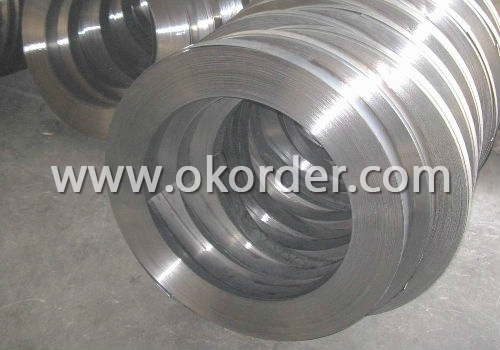
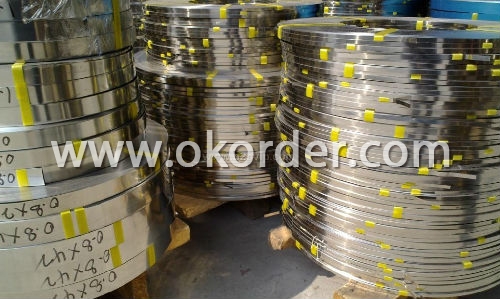
- Q:What are the different types of stainless steel wire grades for different applications?
- There are several different types of stainless steel wire grades available for various applications. Some of the commonly used grades include: 1. Austenitic stainless steel (300 series): This grade is known for its excellent corrosion resistance, high ductility, and good formability. It is commonly used in applications that require resistance to chemical and atmospheric corrosion, such as in food processing, chemical industries, and architectural applications. 2. Martensitic stainless steel (400 series): This grade is characterized by its high strength and hardness. It is often used in applications that require high wear resistance, such as in cutlery, surgical instruments, and industrial equipment. 3. Ferritic stainless steel (400 series): This grade has similar properties to martensitic stainless steel, but with better corrosion resistance. It is commonly used in applications that require resistance to stress corrosion cracking, such as in automotive exhaust systems and heat exchangers. 4. Duplex stainless steel: This grade combines the properties of both austenitic and ferritic stainless steels. It offers high strength, good weldability, and improved resistance to stress corrosion cracking and pitting. It is commonly used in applications that require high strength and corrosion resistance, such as in chemical processing plants, oil and gas industries, and marine environments. 5. Precipitation-hardening stainless steel: This grade can be heat treated to achieve high strength and hardness. It is often used in applications that require good mechanical properties, such as in aerospace components, nuclear reactors, and high-performance tools. It is important to choose the appropriate stainless steel wire grade based on the specific requirements of the application, considering factors such as corrosion resistance, strength, formability, and cost. Consulting with a materials engineer or stainless steel supplier can help determine the most suitable grade for a particular application.
- Q:What are the different types of stainless steel wire ropes used in telecommunications?
- There are several types of stainless steel wire ropes used in telecommunications, including 1x7, 1x19, and 7x7 constructions. These wire rope designs offer different strengths, flexibility, and durability to meet the specific needs of telecommunications applications.
- Q:What are the different types of coatings available for stainless steel wire?
- There are several different types of coatings available for stainless steel wire, including nylon, polyvinyl chloride (PVC), polyethylene (PE), polypropylene (PP), and epoxy. Each coating offers different properties and benefits, such as improved corrosion resistance, increased durability, and enhanced electrical insulation. The choice of coating depends on the specific application requirements and desired performance characteristics.
- Q:How does stainless steel wire resist corrosion?
- Due to its unique composition and surface properties, stainless steel wire is able to resist corrosion. It is primarily composed of iron, chromium, and nickel, with varying amounts of other elements like molybdenum, titanium, and copper added to enhance specific properties. The presence of chromium is key to stainless steel's corrosion resistance. When exposed to oxygen in the atmosphere, chromium forms a thin layer of protective oxide on the wire's surface. This layer, known as passive film or chromium oxide, acts as a barrier, preventing oxygen and moisture from reaching the underlying metal. Thus, the wire is effectively isolated from the external environment, reducing the likelihood of corrosion. Additionally, the chromium oxide layer has the ability to self-heal. If it becomes damaged or disrupted, it quickly reforms when exposed to oxygen, restoring the wire's corrosion resistance. This self-healing property contributes to the durability and longevity of stainless steel wire. The inclusion of nickel further enhances the wire's corrosion resistance. Nickel helps stabilize the passive film and improves its ability to withstand corrosive agents like acids and chlorides. Furthermore, it helps the wire maintain its strength and ductility even in extreme conditions. The choice of specific stainless steel wire grades also impacts its corrosion resistance. Different grades contain varying amounts of chromium, nickel, and other alloying elements, making them suitable for specific applications. For instance, marine-grade stainless steel wire, such as 316 stainless steel, contains higher levels of molybdenum, which enhances its resistance to chloride-induced pitting and crevice corrosion in marine environments. In conclusion, stainless steel wire resists corrosion by forming a protective chromium oxide layer on its surface, acting as a barrier against oxygen and moisture. The addition of other alloying elements, such as nickel and molybdenum, further enhances its resistance to corrosive agents. These unique composition and surface properties make stainless steel wire an excellent choice for various applications where corrosion resistance is crucial.
- Q:The manual work with stainless steel wire to die of
- If the manual method is not good, then you can clamp the stainless steel wire on the lathe, with a lathe to cover the wire, it should be relatively good set of silk.
- Q:Which is good, copper wire stop valve and stainless steel wire stop valve?
- Sure is stainless steel, stainless steel hardness is relatively high, the copper to brittle, corrosion-resistant stainless steel, copper exposure in the air will be oxidized, threaded stainless steel valve for high hardness wire will be overdone because of cracking
- Q:How are stainless steel wire connectors used in plumbing installations?
- Stainless steel wire connectors are commonly used in plumbing installations to provide a secure and reliable connection between different plumbing components. These connectors are designed to join pipes, fittings, and other fixtures together, ensuring a watertight seal and preventing leaks. One of the primary uses of stainless steel wire connectors in plumbing is for connecting pipes. Whether it's joining two lengths of pipe or connecting a pipe to a fitting, these connectors play a crucial role in creating a strong and durable connection. The stainless steel material is highly resistant to corrosion, ensuring the longevity of the plumbing system. Additionally, stainless steel wire connectors are often used in attaching fixtures such as faucets, showerheads, and valves to the plumbing system. These connectors provide a secure link between the fixture and the underlying plumbing infrastructure, ensuring proper water flow and preventing any potential leaks. One of the key advantages of using stainless steel wire connectors in plumbing installations is their flexibility. These connectors can be easily bent and maneuvered to fit into tight spaces or awkward angles, making them highly versatile. This flexibility allows plumbers to navigate around obstacles and create customized plumbing configurations. Furthermore, stainless steel wire connectors are known for their durability and strength. They can withstand high water pressure and temperature variations without compromising the integrity of the connection. This makes them ideal for both residential and commercial plumbing applications. In conclusion, stainless steel wire connectors are essential components in plumbing installations. They are used to connect pipes, fittings, and fixtures, creating watertight seals and preventing leaks. Their flexibility, durability, and resistance to corrosion make them a popular choice among plumbers for various plumbing projects.
- Q:Can stainless steel wire be used for making wire hangers?
- Yes, stainless steel wire can be used for making wire hangers. Stainless steel is a popular choice for wire hangers due to its durability, strength, and resistance to rust and corrosion. It is a versatile material that can withstand heavy loads and maintain its shape over time. Stainless steel wire hangers are commonly used in households, retail stores, and dry cleaning businesses, as they provide a reliable and long-lasting solution for hanging clothes. Additionally, stainless steel wire hangers are also more environmentally friendly compared to plastic hangers, as they can be recycled and reused indefinitely.
- Q:Does stainless steel wire have any health risks?
- Stainless steel wire, in general, poses minimal health risks. It is considered a safe and durable material commonly used in various industries and household applications. However, it's important to note that if the wire is improperly handled or contains certain coatings or contaminants, it may potentially pose health risks. As with any material, it is always advisable to follow proper safety guidelines and avoid prolonged exposure or ingestion of stainless steel wire to ensure overall well-being.
- Q:What are the disadvantages of using stainless steel wire?
- There are a few disadvantages of using stainless steel wire that should be taken into consideration. Firstly, stainless steel wire can be quite expensive compared to other types of wire. This can be a disadvantage for those on a tight budget or those who need large quantities of wire for their projects. Secondly, stainless steel wire has a higher electrical resistance compared to other metals. This means that it may not be the best choice for applications that require low resistance, such as electrical circuits. Additionally, stainless steel wire can be more difficult to work with compared to other types of wire. It is known to be harder and less malleable, which can make it challenging to bend or shape as desired. This can be a disadvantage for those who require intricate or complex wire designs. Moreover, stainless steel wire may not be suitable for certain environments or applications. It is prone to corrosion when exposed to certain chemicals or environments with high acidity. In such cases, alternative materials may be more appropriate to ensure the wire's longevity and functionality. Lastly, stainless steel wire is not as strong as some other types of wire, such as steel or titanium. This means it may not be suitable for applications that require high tensile strength or load-bearing capabilities. Overall, while stainless steel wire has many advantages, it is important to consider these disadvantages and assess whether they align with the specific requirements of your project before choosing to use it.
1. Manufacturer Overview |
|
|---|---|
| Location | Shandong,China |
| Year Established | 2005 |
| Annual Output Value | Above US$5.3 Million |
| Main Markets | Europe, China |
| Company Certifications | ISO9001:2000 |
2. Manufacturer Certificates |
|
|---|---|
| a) Certification Name | |
| Range | |
| Reference | |
| Validity Period | |
3. Manufacturer Capability |
|
|---|---|
| a)Trade Capacity | |
| Nearest Port | Tian Jin |
| Export Percentage | 30% |
| No.of Employees in Trade Department | 40 People |
| Language Spoken: | English;Chinese |
| b)Factory Information | |
| Factory Size: | Above 50,000 square meters |
| No. of Production Lines | Above 8 |
| Contract Manufacturing | OEM Service Offered;Design Service Offered |
| Product Price Range | Average |
Send your message to us
AISI 201 Stainless Steel Strips
- Loading Port:
- China Main Port
- Payment Terms:
- TT or LC
- Min Order Qty:
- 1 Ton m.t.
- Supply Capability:
- 2000 Tons Per Month m.t./month
OKorder Service Pledge
OKorder Financial Service
Similar products
New products
Hot products
Hot Searches
Related keywords
